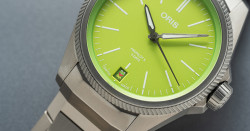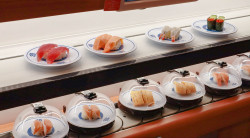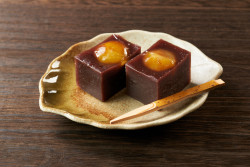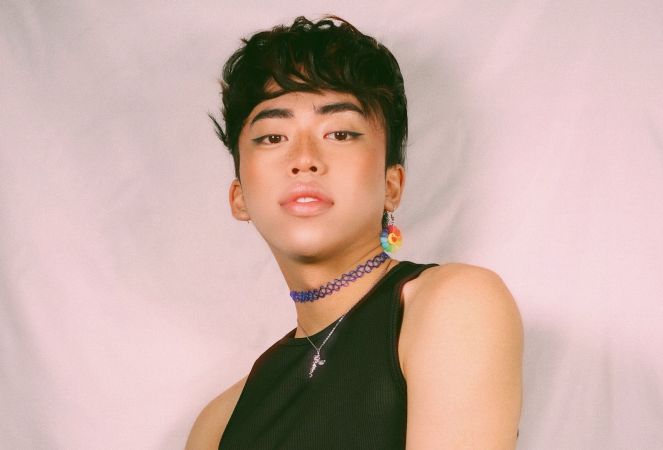
“Oh my God, this is exactly what we used to do,” Stanley Fukase laughs, watching a video of his favorite drag queen strutting on the runway in a glittering gown, lip-synching to Lady Gaga on RuPaul’s Drag Race. He then scrolls through his camera roll to find the 480p clips of him and his brother, aged eleven and six in pre- Paul times, dance-battling it out to “Bad Romance” in dresses made out of bed sheets.
Now 23 and based in Tokyo, both Fukase and his content-creation game have come a long way. His fanbase on TikTok (600k) and YouTube (360k) is ever-growing; he has upgraded his make-shift bedding dresses for some truly show-stopping outfits and, though he still dances to Lady Gaga — he now makes an allowance out of it. But all this is just the tip of what it means to be Fukase.
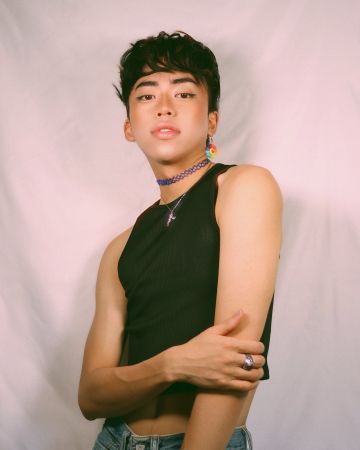
Though he only has two —oftentimes heel-boot-clad — feet, Fukase has planted a firm foot in many of Tokyo’s worlds. A prominent artist in Tokyo’s drag scene and a member of the city’s LGBTQ+ community, he’s also part of Tokyo’s ever-evolving tribes of influencers and creatives. His core is, inevitably, multipilicious and entangled with that of his vivacious and glitzier partner in crime: his drag queen persona Xtra. But what does it take to be an openly-gay influencer, a drag artist and a citizen in a society that, however outdated it may seem, still makes being anything other than heterosexual a pretty risky thing to navigate?
Big dress, big hair, big attitude. Popularized by shows like RuPaul’s Drag Race and The Boulet Brothers’ Dragula, drag artists are no strangers to the western media spotlight. Fly to Japan though, and you will likely find more endangered species of crane than drag queens. When Fukase moved to Tokyo from the Philippines four years ago, he was shocked to hear that most gay people he met didn’t know what drag was. Even in the epitomic LGBTQ+ hub, Shinjuku Ni-chome, drag events are still a rarity.
“Is drag like kabuki?”
Fukase has lost count of the number of times people in Japan have asked him this question. With men working glittering costumes and contouring that would put Kim Kardashian’s cheekbones to shame, it’s understandable why some people in Japan may think drag feels like a bolder version of onnagata (a kabuki actor playing a woman’s role). However, Fukase stresses that onnagata and drag are disparate; drag is not as simple as crossdressing men role-playing women. “Onnagata is a role played by men,” says Fukase, “whereas drag is an expression of identity.”
Gender and drag don’t exclusively sit in the same Venn diagram either. Especially in Japan, with its limited knowledge about drag culture, there is a misconception that drag queens comprise of cis-gay men. While that is a common demographic, straight men, women, trans-women, anyone can walk up on stage and be a drag artist — even aliens. Xtra’s fellow stage star often rocks an alien costume to surprise the crowds. “Drag doesn’t have anything to do with gender,” says Fukase and, from the looks of it, it might not have anything to do with being human either. Rather, Fukase defines drag as an act of selling a fantasy to the crowd. It’s the whole performance, the atmosphere, the energy.

Genderless aliens, heels, poles, hoops, strobe lights, blasting music — before you venture out on a Friday night to a Shibuya drag hotspot, let Xtra give you a heads up. In the U.S, drag show audiences wave around dollar bills to tip their queens. However, small cash bills are virtu- ally nonexistent in Japan and so “YAASS yen” exists instead. This fake currency swaps out Mr. Noguchi’s face for a bold-fonted “YAASS” and are sold in sets of five for ¥1,000. Xtra’s drag house, Haus of Gaishoku, does allow you to also sneak some real bills into your favorite queen’s outfit.
At the end of the night, the artists cash up their “YAASS yen,” but the real yen pours in from elsewhere. Or, let’s say trickles. Event organizers usually pay Tokyo’s drag artists commission, oftentimes based upon the number of tickets they sell. “I don’t know any drag queens who do drag full time yet,” says Fukase, “it’s not a big money maker.” Given its relatively unknown status, even within the LGBTQ+ community, drag shows and events are under-advertised and performers usually lack the funds to provide large-scale promotion themselves, meaning full-time work remains a fantasy and most artists must balance performing drag alongside their main careers or side jobs.
“It’s not that there aren’t enough gay people in Tokyo, it’s that there aren’t enough openly gay people.”
While Xtra is out living her dream, Fukase is building another side of their life: YouTube. While he loves being a creator, he’s sometimes skeptical of the genuinity of influencer relationships. We viewers see bubbly YouTubers laughing, teasing and taking on ridiculous challenges together in “collabs” like they’re best buds, while on the other side of the camera it’s business. Chumming up with the right YouTubers boosts views, subscriber counts, sponsors and well, money (and not the “YAASS yen” kind). Given these ulterior motives, Fukase sometimes doubts whether other influencers are approaching him for a genuine connection or just to size up his follower count.
When it comes to his own content, Fukase doesn’t try to hide any part of who he is. An openly gay man, with a naturally outgoing personality and cynical humor, Fukase’s TikTok content is loved by his English-speaking fans. However, his Japanese fans are slightly skeptical, to say the least. When he first joined the TikTok community, he began by posting skits in Japanese. Little did he know of the backlash he was about to face from an allied army of homophobes and xenophobes. “My humor also wasn’t well received by the Japanese users… I even got death threats,” he explains.
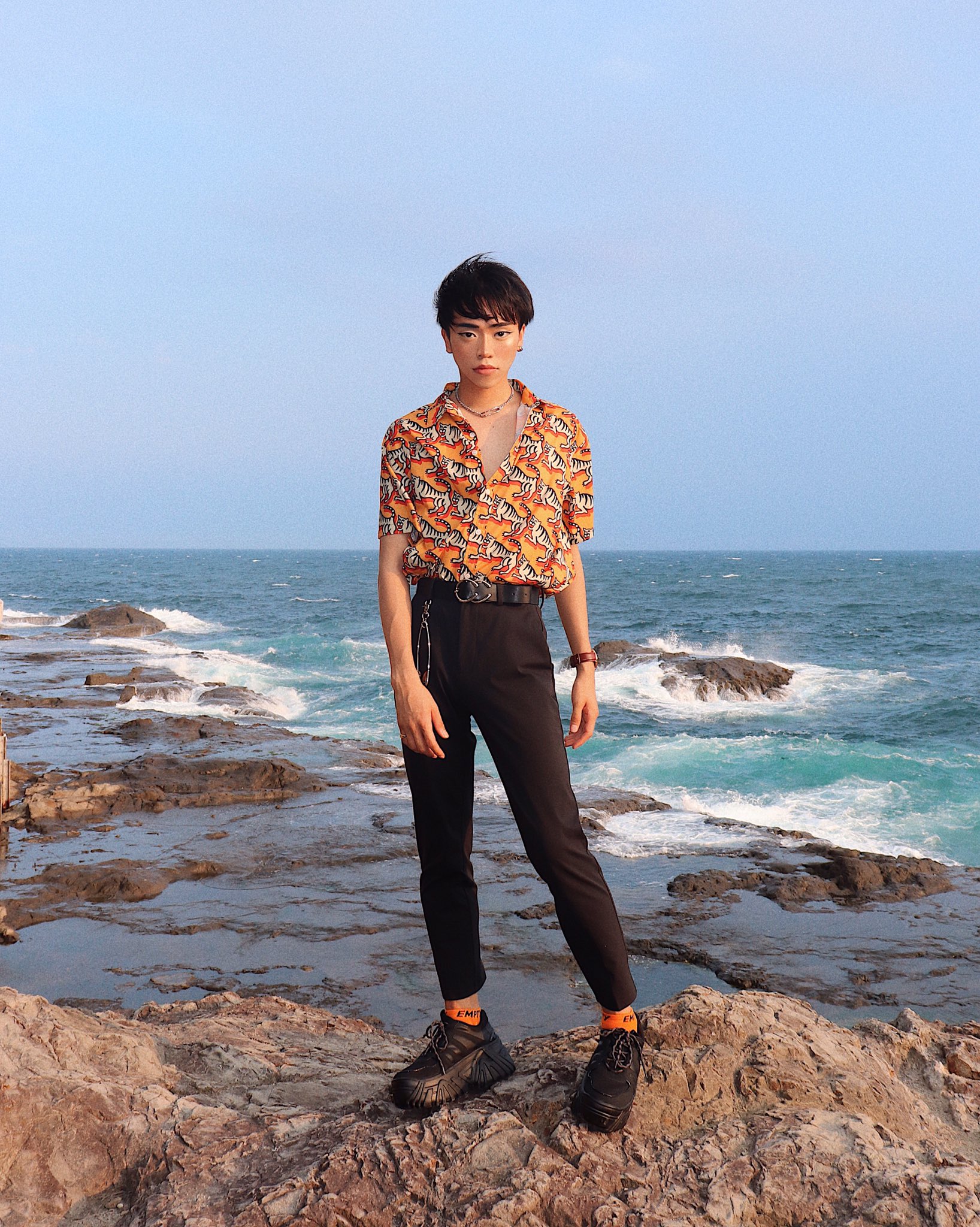
The internet offers a shield of anonymity that only exacerbates hostile comments like these, but is the offline world any nicer for a gay Tokyoite? While not everyone receives the abuse and death threats in their comments like Fukase, being openly gay in Japan is still, unfortunately, a risky ordeal and the Japanese work environment remains a scary place for expressing sexuality. Now imagine being openly gay and walking around in knee-high boots and purple eyeliner? Believe it or not, people won’t look twice — as long as it’s October 31.
“There’s an inside joke within the drag community here that if you dress up as a woman on Halloween, you will become a drag queen,” laughs Fukase. Despite Halloween in Shibuya seeming to exclusively be a horror for costume-clad university students and discarded cans of Chuu Hai, it’s a safe haven for anyone who is curious to dip their toes into drag culture’s eye-shimmery waters — just ask 2019-Fukase yourself. Many of his drag sisters also took their first step into the drag world this way, on the one evening that Japan seems to forget about its discrimination against and incertitude towards the drag community. “It’s a safe place to just dress up, go outside and no one will care,” says Fukase.
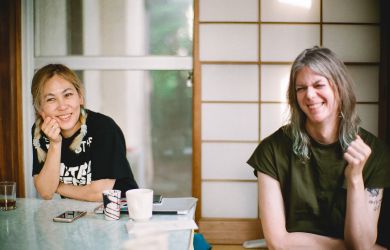
Despite his internet fame and nightlife stardom, Fukase lives his daily life in the most unconventional corners of Tokyo. He wakes up to film himself eating breakfast and chats to a camera lens for an hour. He then posts a “good morning, stan stans” selfie on Instagram before spending the afternoon edit- ing video content for his channel, worldofxtra, next Wednesday. Xtra takes over when the sun goes down as she pulls on her favorite look paired with winged liner and an equally dramatic attitude. Some people wear many hats in life, for Fukase, he’s wearing all of them — and totally pulling it off.
Follow worldofxtra on YouTube and Instagram
Elsewhere on Metropolis:
Why Won’t Japan Allow This Trans Woman’s Marriage?
The case that broke the Japanese legal system

Japan in Love
Four years after Shibuya introduced same-sex partnerships, Metropolis spoke to same-sex couples in Tokyo on love, marriage and equality

Barbie
The Japanese comedian helping body positivity bloom



